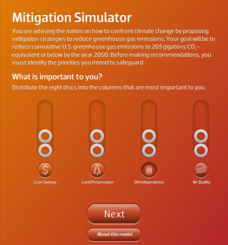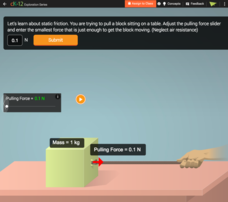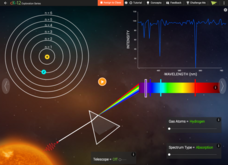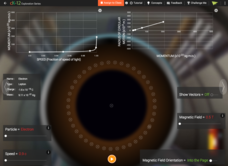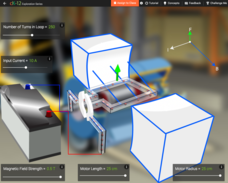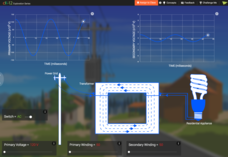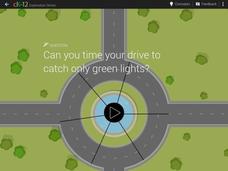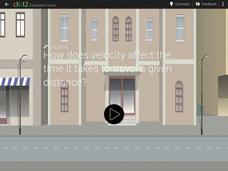National Academy of Sciences
Mitigation Simulator
The United States has more per capita emissions than any other country in the world. An eye-opening simulation encourages users to explore environmental goals and factors that affect climate change by balancing different priorities....
CK-12 Foundation
Friction Simulation
How much pulling force does it take to overcome static friction? The simulation applies the formula for the force of static friction to multiple trials. Scholars alter the pulling force applied until the box moves. They then determine...
CK-12 Foundation
Preschool Races
What determines which ball rolls the fastest — the weight, the radius, the material, or something else? Scholars select two balls to race down the inclined plane, determining their material and radius. As they race, the simulation graphs...
CK-12 Foundation
Marie Curie's Classroom
What makes some elements stable and others radioactive? Scholars adjust the number of protons and neutrons in an element then observe its decay. The simulation includes a graphical representation and the chemical formula, as well as...
CK-12 Foundation
Black Hole
What happens to radio waves, time, and light in and near a black hole? Young scientists explore what is known about observing frequency and time at various distances from a black hole. They control the size of the black hole and the...
CK-12 Foundation
Atomic Colors
Stars are too hot to visit, so how do we know what different stars are made of? An enlightening simulation uses a spectrum graph to show the various electron emission and absorption reactions. Scholars experiment with both helium and...
CK-12 Foundation
Particle Tracks
Did you know physicists can identify new particles by observing the path they take in a particle accelerator? Scholars explore the variables that determine the direction and radius of the circular path different particles take. They...
CK-12 Foundation
Electric Motor
How does a direct current run a motor? Pupils control five variables in an electric motor and observe how the force diagram changes. The force, magnetic field, and current vary based on the changes in the design of the magnet and...
CK-12 Foundation
AC Transformer
High voltage power lines deliver electricity to homes, but each home requires low voltage. How does the energy get converted so it can be used safely? Pupils explore alternating current and transformers through a simulation. They control...
CK-12 Foundation
Car Collision
When a car crashes into a wall, does it just stop or does it bounce or roll backwards? A simulation relates velocity, kinetic energy, momentum, and restitution to answer this question. Scholars apply their knowledge through...
CK-12 Foundation
Angular Speed Simulation
Can you time the speed of your car perfectly so you only hit green lights? The challenge in the simulation is to alter the timing of the lights or the speed of the car in order to do just that. Scholars learn about angular speed as they...
CK-12 Foundation
Electric Analogies
We can see the result of electricity but not the process itself. The simulation compares electric circuits to a water tower and water wheel cycle. Young scientists adjust the height of the tower, the amount of resistance, and if...
CK-12 Foundation
Dungeon Simulation
Tommy is stuck in a dungeon and can only escape if you can discover the correct formula for velocity! Through trial and error, scholars enter the velocity required for Tommy to reach the elevator at the proper time. Then they extrapolate...
CK-12 Foundation
Relative Velocity Simulation
If your pupils think relative velocity is the velocity at which you can run away from your relatives, they need this simulation. Two bikers want to meet at a specific time. Scholars alter the velocity of one rider to arrange the...
CK-12 Foundation
Radiocarbon Dating
How do we know how long ago a dinosaur lived or an ancient fire pit was used? Scholars learn about the application of carbon dating and half lives to discover things about the past. They adjust the amount of radioactive carbon in the...
CK-12 Foundation
Subatomic Particle Zoo
Everything is made up of atoms, but what are atoms made up of? The simulation explores subatomic particles. It focuses on hadron, boson, and lepton groupings as scholars learn about quarks, neutrinos, gluons, and more.
CK-12 Foundation
Doorbell
What are some simple uses for an electromagnet? Scholars explore the electromagnetic circuitry in a doorbell through an interesting simulation. They control the core material, number of loops, amount of current, and strength in a spring....
University of Minnesota
Virtual Neurons
It's electric! Young anatomists use Virtual Neurons software to build, control, and analyze complex nerve circuits within the body. Colorful and packed with content, class members enjoy interacting with the nervous system...
Columbus City Schools
Diversity of Living Things
Here's a topic classes can really dig—the fossil record. Use the well-organized and thoughtful road map to take eighth graders back in time to unearth the answer. Learn how our climate has changed, and how organisms have...
CK-12 Foundation
Pan Flute
How can a pan flute sound one note while we hear a chord? The simulation explores sound waves, vibrations, and harmonics at the molecular level. Scholars control the pipe into which air is being blown, the length of the pipe, and which...
CK-12 Foundation
Galvanometer
In 1820, Hans Christian Orstead discovered the link between electricity and magnetism, which allows us to measure current and voltage. The simulation allows scholars to observe the inner workings of an ammeter and voltmeter as they...
CK-12 Foundation
Telegraph
Most pupils don't know what a telegraph is, much less how one works. A secret simulation has scholars pick the size of the primary and secondary loops, the battery voltage, and which letters in the Morse Code they want to transmit. They...
CK-12 Foundation
Field Lines
The earth has a giant magnetic field caused by the liquid iron that constantly moves in the outer core. Scholars explore the magnetic fields of four different planets. The strength and alignment of the poles relates to the implications...
CK-12 Foundation
Touch Screen
Touch screens are becoming more common, but how do they work? The simulation shows the electric potential versus system charge as scholars alter three variables. The schematic of the capacitance demonstrates the set up as each variable...


